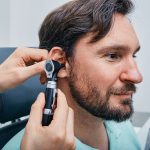Hearing loss is one of the most common health issues people live with today. Impacting over 48 million people, hearing loss is pervasive. Though nearly 1 in 6 people has some degree of impaired hearing, hearing loss remains widely underrated. Unaddressed symptoms can have significant effects on everyday life. Untreated hearing loss strains communication, relationships, and social life, as well as increases health risks. Recent research also shows that it can affect physicality by reducing movement and mobility.
Fortunately, there is an array of hearing healthcare services and solutions that transform hearing health. Treating hearing loss offers countless benefits including improving physicality and quality of life.
Link Between Hearing Loss and Reduced Physicality
Studies show that hearing loss can reduce physical movement. Research highlights that hearing challenges can restrict movement and engagement. Two studies that examine the correlation between hearing loss and reduced physicality are:
- Study Published in JAMA Otolaryngology Head Neck Surgery. This recently published study was conducted by researchers in Spain who looked at the impact of hearing loss on physical function, faulty, and disability in older adults. They did this by assessing mobility and capacity to perform everyday tasks that involve movement among 1644 people, ages 65 and older. Researchers found that 13.6% of these participants had hearing loss. After assessing results among people with and without hearing loss, researchers found an association between hearing loss and impaired lower extremity function, frailty syndrome, and disability in instrumental activities of daily living (IADL).
- Study by the University of Jyväskylä and the University of Tampere. This study was conducted by researchers in Finland who analyzed the impact of hearing loss on mobility. They did this by evaluating the hearing health and mobility of 848 people, ages 75-90. These participants were evaluated for two years. Key findings from this study include: people with hearing loss were more than twice as likely to limit their movements compared to people without hearing loss. Reduced movement involved going out less and spending less time with others.
These studies highlight that hearing loss can affect physicality and movement. These tend to be less recognized symptoms of untreated hearing loss.
Impact Hearing Loss has on Overall Mobility
Though hearing loss impacting mobility may not seem like an obvious link at first, once you understand the everyday symptoms of living with impaired hearing, this link becomes clearer. Hearing loss reduces the capacity to hear and process speech as well as sound which creates a variety of symptoms. This includes tinnitus which is a ringing or buzzing-like noise in the ears, sounds slurred or muffled, and experiencing difficulty hearing speech in settings with noise. These symptoms, as you can imagine, make it hard to have and follow conversations. People may experience miscommunication, unpleasant interactions, and discomfort navigating conversations.
Strained communication often leads to limiting conversations and communication altogether. This often looks like spending less time with family and friends, not going out to social gatherings, avoiding activities/hobbies, etc. A common effect of untreated hearing loss is social withdrawal. This increases isolation, loneliness, and other depressive symptoms. It also results in reduced physicality and movement as people are engaging less. People retreat and stay in more which affects physical and mental health.
Treatment Improves Physicality
Treating hearing loss provides major benefits that truly transform health and quality of life. There are different hearing technologies and solutions that are designed to alleviate symptoms and maximize hearing capacity. The most common treatment for hearing loss is hearing aids which are electronic devices equipped with innovative technology that absorbs and processes sound. This provides the ears and brain with ample support, making it easier to hear as symptoms are alleviated and sound is clarified.
Hearing aids increase speech comprehension and strengthen communication. People can better hear and respond to others and participate in conversations without the hassle and discomfort of symptoms. Hearing aids also come with various features that provide support in different environments like social settings. This includes reducing background noise and delivering crisp sound which helps people navigate social activities and environments with greater ease. Hearing aids enrich social life and provide the support needed for people to live active lives. This improves physicality and daily engagement with others and the world.
Contact us today to learn more and to prioritize your hearing health by scheduling an appointment for a hearing consultation.






